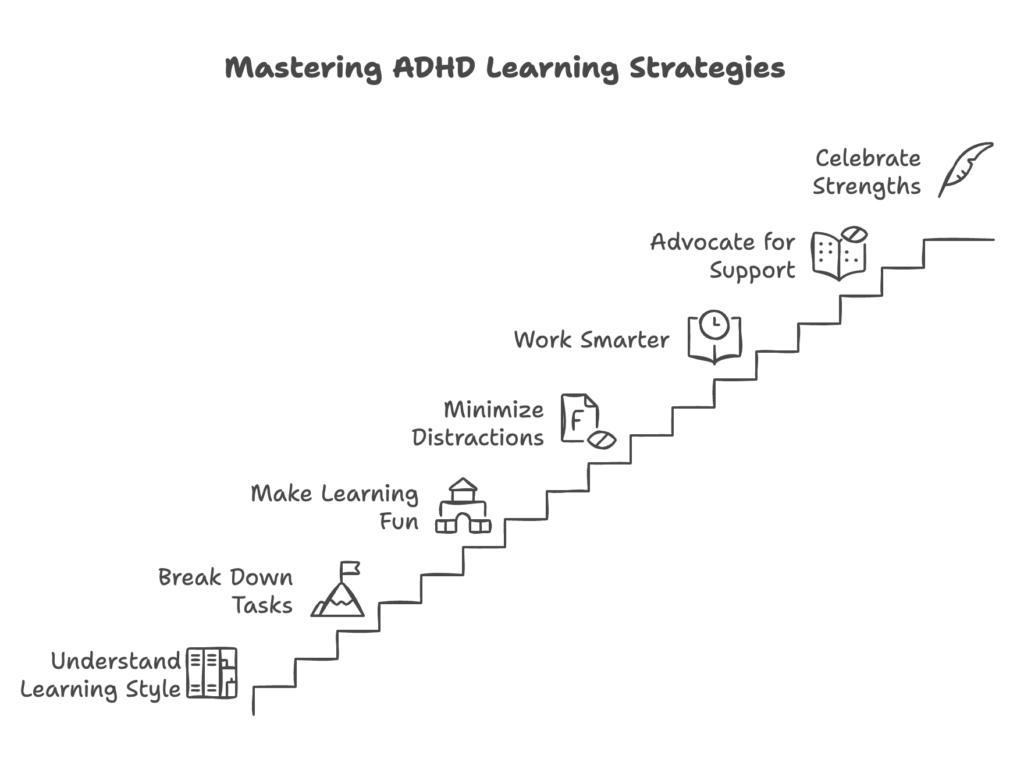ADHD and Learning: What’s Really Going On?
ADHD can interfere with learning in several ways. It’s not about intelligence (you’ve got plenty of that!)—it’s about how ADHD affects the brain’s ability to focus, organize, and retain information. Here’s a quick rundown of what’s happening:
- Inconsistent Focus: One minute you’re all in, the next you’re lost in thought about that weird noise your fridge makes.
- Memory Glitches: Forgetting what you just learned or losing track of instructions.
- Procrastination: Getting started feels like pushing a boulder uphill.
- Overwhelm: Big tasks or too much information can leave you frozen instead of moving forward.
Sound familiar? Let’s look at how to overcome these hurdles.
Step 1: Understand Your ADHD Learning Style
First things first—recognize how you learn best. Everyone has unique strengths, and ADHD often enhances certain types of learning.
Ask Yourself:
- Do I learn better through hands-on activities or by watching videos?
- Do visuals help me retain information, or am I more of a listener?
- When am I most alert and focused during the day?
Step 2: Break It Down to Beat Overwhelm
Big assignments or dense reading materials can feel like Mount Everest. The trick? Break them into smaller, manageable pieces.
How to Do It:
- Turn a chapter into a list of smaller sections to tackle one at a time.
- Set short, specific goals: “Read three paragraphs and summarize the main point.”
- Use timers like the Pomodoro Technique (25 minutes of focus, 5 minutes of break).
Pro Tip: Celebrate mini-victories—like completing a section or solving a tough problem. Small wins build momentum.
Step 3: Make Learning Fun and Interactive
Learning doesn’t have to be boring! Find ways to engage your ADHD brain by making it exciting and interactive.
Ideas to Try:
- Use Apps or Games: Apps like Quizlet or Kahoot turn studying into a game.
- Draw It Out: Create colorful mind maps or doodles to visualize information.
- Teach Someone Else: Explaining concepts to a friend or family member can reinforce your understanding.
Step 4: Minimize Distractions
Your ADHD brain is wired to notice everything—the ticking clock, the fly buzzing around, or even your own thoughts. Creating a distraction-free zone can work wonders.
How to Focus:
- Tidy Your Workspace: Keep it clean and uncluttered.
- Limit Tech Interruptions: Use apps like Focus Mode or Forest to block social media during study time.
- Use Noise-Canceling Tools: Try noise-canceling headphones or calming background music.
Step 5: Work Smarter, Not Harder
The goal isn’t to spend more time learning—it’s to spend your time effectively.
Smart Learning Tips:
- Study in Short Bursts: ADHD brains thrive on short, intense focus periods.
- Repeat and Reinforce: Review material often to lock it into long-term memory.
- Ask for Help: Tutors, study groups, or even a buddy system can provide extra support.
Step 6: Advocate for Yourself
Sometimes, learning struggles aren’t just about you—they’re about the environment you’re in. If you need extra support, don’t hesitate to speak up.
Who to Talk To:
- Teachers or professors about accommodations like extra time on tests.
- Counselors for strategies to manage workload.
- Family members for understanding and encouragement.
Pro Tip: Don’t think of it as asking for special treatment—it’s about leveling the playing field so you can show your full potential.
Step 7: Celebrate Your ADHD Superpowers
ADHD isn’t just about challenges—it comes with unique strengths that can actually boost your learning when harnessed correctly.
Your ADHD Strengths:
- Hyperfocus: When you’re passionate about a topic, you dive in deep.
- Creativity: You think outside the box and find innovative solutions.
- Curiosity: ADHD often fuels a hunger for knowledge.

Journey
Learning with ADHD can feel like running a marathon in flip-flops, but here’s the thing: You can do it. ADHD doesn’t stunt your growth—it just asks you to take a different route.
Embrace your unique learning style, use tools and strategies to work smarter, and don’t shy away from asking for help when you need it. With patience, practice, and a bit of creativity, you’ll surprise yourself with how much you can achieve.
You’re not behind—you’re just finding your way.









